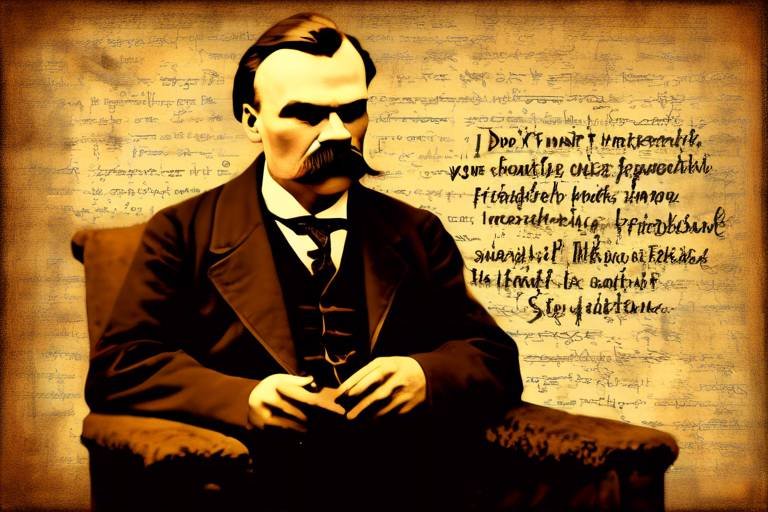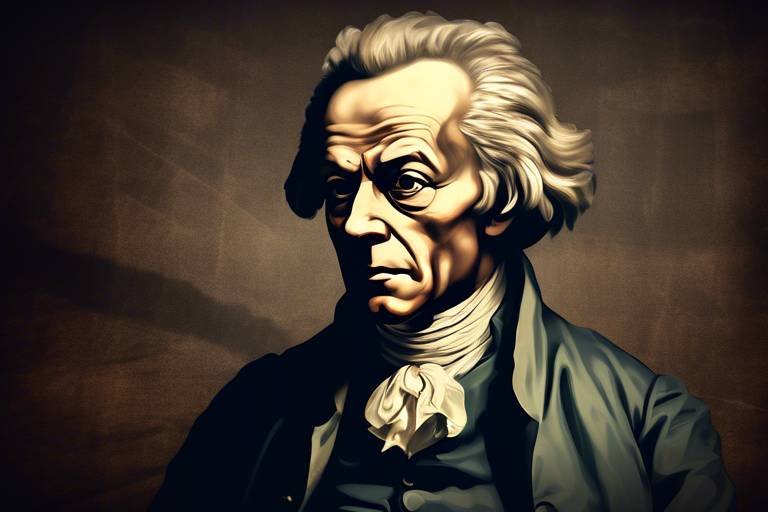Humanism in the Eyes of Erasmus
Humanism emerged as a transformative force during the Renaissance, reshaping the intellectual landscape of Europe. At the forefront of this movement was Desiderius Erasmus, a Dutch philosopher and theologian whose ideas and writings have left an indelible mark on modern thought. Erasmus championed the notion that human beings are capable of reason and moral choice, advocating for a return to the values of classical antiquity while simultaneously critiquing the societal norms of his time. His influence extended beyond mere academic circles, touching on education, religion, and the very fabric of society itself.
In a world dominated by superstition and dogma, Erasmus's emphasis on critical thinking and ethical living provided a refreshing perspective. He believed that individuals should strive for personal growth and enlightenment through education and self-reflection. This approach not only empowered individuals but also encouraged them to question established norms and seek a deeper understanding of their faith and existence. Erasmus’s works resonate with the idea that the pursuit of knowledge is not just an academic endeavor but a moral obligation that can lead to a more just and humane society.
One of Erasmus's most significant contributions to humanism was his engagement with classical literature. He recognized the profound wisdom contained in the texts of ancient Greece and Rome, believing that these works held the key to understanding human nature and morality. By reviving and disseminating classical literature, Erasmus sought to enrich contemporary thought and education, bridging the gap between the past and the present. His efforts served as a catalyst for the Renaissance's broader intellectual revival, encouraging others to explore the depths of human experience through literature, philosophy, and art.
Moreover, Erasmus's writings, particularly his Latin works such as In Praise of Folly, satirically critiqued the societal and religious norms of his day. Through humor and wit, he challenged the status quo, exposing the hypocrisy and corruption that plagued the Church and society. This fearless examination of established institutions not only entertained readers but also prompted them to reflect critically on their beliefs and practices. Erasmus's ability to blend literary artistry with profound philosophical insights made his works enduringly influential, resonating with audiences for centuries.
In essence, Erasmus's vision of humanism was not merely an intellectual exercise; it was a call to action. He believed that education could cultivate moral character and critical thinking, empowering individuals to contribute positively to society. By advocating for reforms in education, he aimed to create a more enlightened society where knowledge and ethics would guide human interactions. His legacy is a testament to the power of humanism to inspire change and foster a deeper understanding of the human condition.
- Who was Erasmus? Erasmus was a Dutch philosopher and theologian who played a key role in the Renaissance humanism movement.
- What are the core principles of Erasmus's humanism? His core principles include the importance of education, critical thinking, and moral philosophy.
- How did Erasmus contribute to literature? He authored significant works such as In Praise of Folly, which satirized societal norms and challenged religious practices.
- What was Erasmus's view on religion? He advocated for reform rather than revolution, critiquing church practices while encouraging a return to original Christian texts.

The Life of Erasmus
Erasmus of Rotterdam, born around 1466, emerged as one of the most influential figures of the Renaissance, and his life journey is a testament to the power of education and critical thought. Growing up in the Netherlands, he was no stranger to the struggles of the time. Orphaned at a young age, he found refuge in the monastic life, which provided him with an early education. This formative experience ignited a passion for learning that would guide him throughout his life. Imagine a young boy, surrounded by dusty tomes and the echoing chants of monks, slowly realizing that knowledge was not just a tool for survival, but a key to unlocking the mysteries of the world.
Erasmus’s thirst for knowledge propelled him to travel extensively across Europe. From the bustling streets of Paris to the intellectual hubs of Italy, he absorbed the ideas of the time, engaging with scholars and thinkers who would shape his humanist ideals. His travels were not just physical; they were a journey of the mind, where he encountered diverse philosophies and cultures. This exposure enriched his understanding and deepened his commitment to humanism. In fact, his interactions with the likes of Thomas More and other prominent figures of the Renaissance fueled his desire to advocate for educational reform.
Throughout his life, Erasmus maintained a keen focus on the importance of education. He believed that education was the bedrock of a just society, capable of shaping moral character and fostering critical thinking. As he once famously said, "The main hope of a nation lies in the proper education of its youth." This conviction led him to write extensively on educational methods, emphasizing the need for a curriculum that included classical literature, rhetoric, and moral philosophy. His works, such as "The Education of a Christian Prince," offered practical guidelines for rulers and educators alike, advocating for a more enlightened approach to governance and learning.
Erasmus’s life was also marked by his dedication to the revival of classical texts. He believed that the wisdom of ancient philosophers could illuminate contemporary issues and guide individuals toward ethical living. His passion for classical literature was not merely academic; it was a call to action for his contemporaries to embrace the teachings of the past. He sought to make these texts accessible, believing that the revival of ancient wisdom was essential for the intellectual and moral rejuvenation of society.
In summary, the life of Erasmus was a rich tapestry woven with threads of education, travel, and a profound commitment to humanist ideals. His journey from a humble upbringing to becoming a leading figure of the Renaissance embodies the transformative power of knowledge and the enduring quest for truth. By examining his life, we gain valuable insights into the foundations of modern thought and the importance of nurturing the human spirit through education and critical inquiry.

Core Humanist Principles
The essence of humanism as articulated by Erasmus revolves around a few core principles that continue to resonate in modern society. At its heart, humanism emphasizes the importance of education, critical thinking, and moral philosophy. Erasmus believed that education was not just about acquiring knowledge but about nurturing the whole person—mind, body, and spirit. He envisioned a world where individuals would not only learn facts but also develop the ability to think critically about those facts and their implications in real life.
One of the most striking aspects of Erasmus's philosophy is his insistence on the role of individual potential. He argued that each person possesses innate capabilities that can be cultivated through proper education and moral guidance. This belief in the power of the individual was revolutionary at the time and laid the groundwork for later developments in personal freedom and self-actualization. Erasmus's humanism encouraged people to look inward and recognize their own worth, challenging the prevailing hierarchical structures of his day.
Moreover, Erasmus's advocacy for ethical living highlighted the importance of morality in human interactions. He believed that a well-rounded education should include a strong moral component, guiding individuals to make choices that reflect their values and contribute positively to society. This emphasis on ethics is particularly relevant today, as we navigate complex social issues that require not just knowledge but also a deep understanding of right and wrong.
To illustrate these principles, we can summarize Erasmus's core humanist ideals in the following table:
| Core Principle | Description |
|---|---|
| Education | Holistic development of individuals through learning and critical thinking. |
| Individual Potential | Recognition and cultivation of each person's unique abilities. |
| Ethical Living | Guidance towards making morally sound decisions in everyday life. |
In summary, Erasmus's core humanist principles serve as a reminder of the power of education, the importance of individual potential, and the necessity of ethical living. These concepts not only shaped the Renaissance but also continue to influence our understanding of personal and societal growth today. By embracing these principles, we can aspire to create a more enlightened and compassionate world, where individuals are valued for their humanity and ethical contributions.

Erasmus and Classical Literature
Erasmus’s relationship with classical literature was nothing short of revolutionary. He believed that the ancient texts of Greece and Rome held the keys to understanding not just the world, but also ourselves. Imagine standing in a vast library, filled with the wisdom of centuries past—this was how Erasmus viewed classical literature. He saw it as a treasure trove that could illuminate the minds of contemporary thinkers and scholars, guiding them toward a more enlightened existence. Through his passionate advocacy, he sought to revive these texts, making them accessible to a broader audience who could benefit from their insights.
One of Erasmus’s most significant contributions was his emphasis on the importance of reading and interpreting these classical works. He argued that through critical engagement with texts, individuals could cultivate their intellect and moral character. In his own words, he stated, "To read is to travel; it is to see the world through the eyes of others." This perspective not only highlights the transformative power of literature but also underscores the necessity of education in developing a well-rounded individual.
Erasmus didn’t just stop at promoting the classics; he actively engaged with them. He produced numerous editions of classical texts, often annotating them to provide context and insight. His work on Adagia, a collection of proverbs and sayings from classical authors, exemplifies his commitment to preserving and disseminating ancient wisdom. By doing so, he enabled readers to reflect on the moral lessons embedded within these sayings, encouraging them to apply these timeless principles to their lives.
Moreover, Erasmus recognized the relevance of classical literature in addressing contemporary social issues. He often drew parallels between the moral dilemmas faced in ancient times and those in his own society. For instance, he would highlight how the ethical teachings of philosophers like Socrates and Plato were still pertinent to the challenges of the Renaissance. This ability to connect the past with the present not only enriched his writings but also inspired others to look to classical sources for guidance in navigating their own lives.
In a world that was rapidly changing, where the Reformation was stirring the pot of religious and social upheaval, Erasmus’s dedication to classical literature served as a stabilizing force. He believed that by grounding ourselves in the wisdom of the ancients, we could better understand our own humanity and the complexities of society. This fusion of classical thought with contemporary issues laid the groundwork for a deeper appreciation of literature and its role in shaping human experience.
In summary, Erasmus’s engagement with classical literature was not merely an academic pursuit; it was a passionate call to recognize the enduring value of ancient wisdom. His efforts to revive these texts and make them relevant to modern readers not only enriched the intellectual landscape of his time but also paved the way for future generations to explore the profound insights contained within the works of the ancients. As we reflect on his contributions, it becomes clear that Erasmus was not just a scholar; he was a bridge between the past and the present, urging us all to embrace the lessons of history.
- What was Erasmus's main contribution to humanism? Erasmus's main contribution was his emphasis on education, critical thinking, and the revival of classical literature, which he believed were essential for moral and intellectual development.
- How did Erasmus view the role of classical literature? He viewed classical literature as a vital resource for understanding human nature and ethical living, believing that it could guide individuals in their moral pursuits.
- Did Erasmus advocate for religious reform? Yes, Erasmus advocated for reform within the church, promoting a return to original Christian texts and critiquing corruption while encouraging a more authentic expression of faith.

Influence of Greek Philosophy
The influence of Greek philosophy on Erasmus is akin to a rich tapestry, intricately woven with threads of rationality, ethics, and the pursuit of knowledge. Erasmus, much like a skilled artisan, took the foundational ideas of ancient thinkers such as Socrates, Plato, and Aristotle and blended them into his own humanist framework. This integration was not merely academic; it was a vibrant philosophy that sought to challenge the status quo and inspire a new way of thinking about humanity and morality.
One of the most significant aspects of Greek philosophy that Erasmus embraced was the concept of rational inquiry. He believed that human beings possess the innate ability to reason and that this capacity should be cultivated through education. In his view, education was not just about rote memorization but about encouraging individuals to ask questions, seek answers, and engage in meaningful dialogue. This approach to learning aligns closely with the Socratic method, which emphasizes critical thinking and the importance of questioning assumptions.
Moreover, Erasmus was deeply influenced by the ethical dimensions of Greek thought. He argued that understanding ethics was essential for a well-rounded education. Just like the ancient philosophers who deliberated on the nature of virtue and the good life, Erasmus encouraged his readers to reflect on moral questions and strive for a life of integrity and virtue. He believed that true education should not only impart knowledge but also foster a sense of moral responsibility in individuals.
In his writings, Erasmus often referenced classical texts, using them as a foundation to critique contemporary society and its norms. His work can be seen as a bridge between the ancient wisdom of Greece and the emerging ideas of the Renaissance. By reviving these classical ideas, he sought to enrich the intellectual landscape of his time, urging people to look back at the ancients for guidance in their quest for a more enlightened society.
To illustrate the profound impact of Greek philosophy on Erasmus, consider the following table that highlights key Greek philosophers and their contributions that resonated with Erasmus:
| Philosopher | Key Contributions | Influence on Erasmus |
|---|---|---|
| Socrates | Development of the Socratic method, emphasis on ethics | Encouraged critical thinking and self-examination |
| Plato | Theory of Forms, idealism | Inspired the pursuit of higher ideals and moral truths |
| Aristotle | Empirical observation, ethics, and politics | Promoted rational inquiry and ethical living |
In conclusion, the influence of Greek philosophy on Erasmus was profound and multifaceted. It shaped his views on education, ethics, and the role of humanity in the pursuit of knowledge. By integrating these ancient ideas into his humanist philosophy, Erasmus not only honored the legacy of Greek thought but also paved the way for a more rational and ethical approach to life that continues to resonate in modern discourse.
- What is the significance of Erasmus in the Renaissance?
Erasmus is often regarded as one of the most influential figures of the Renaissance, promoting humanist ideals that emphasized education, critical thinking, and ethical living.
- How did Greek philosophy influence Renaissance humanism?
Greek philosophy provided a foundation for Renaissance humanists like Erasmus, who integrated concepts of rational inquiry and ethics into their work, encouraging a focus on human potential and moral responsibility.
- What role did education play in Erasmus's philosophy?
Erasmus viewed education as a vital tool for personal and societal improvement, advocating for a curriculum that fostered critical thinking and moral character.

Latin Works and Their Impact
Erasmus's Latin writings are not just mere texts; they are vibrant reflections of his thoughts, ideals, and critiques of the society he lived in. One of his most famous works, In Praise of Folly, is a brilliant satire that cleverly critiques the follies of society and the church. In this work, Erasmus uses humor and wit to expose the absurdities of human behavior, making it both entertaining and thought-provoking. The impact of this piece was profound, as it resonated with the growing discontent towards the church and its practices, paving the way for the Reformation.
His Latin works served multiple purposes. They were educational, aiming to enlighten readers about moral philosophy and ethics, while also acting as a mirror reflecting the societal issues of his time. Through his writings, Erasmus sought to challenge the status quo, encouraging individuals to think critically about their beliefs and the world around them. This blend of humor and serious critique made his works accessible and engaging, allowing them to reach a broader audience.
Moreover, Erasmus's emphasis on the importance of returning to original texts, particularly the scriptures, marked a significant shift in religious thought. He believed that a genuine understanding of Christianity could only be achieved through direct engagement with the Bible, free from the interpretations and corruptions of the church. This idea was revolutionary, as it laid the groundwork for many reformers who followed in his footsteps, advocating for a more personal and authentic relationship with faith.
To illustrate the impact of Erasmus's Latin works, consider the following table that highlights some of his key writings and their significance:
| Work | Year | Significance |
|---|---|---|
| In Praise of Folly | 1509 | Satirical critique of societal norms and church practices. |
| The Education of a Christian Prince | 1516 | A guide for rulers on ethical governance and moral leadership. |
| Colloquies | 1518 | Dialogues that address various social and religious issues. |
| Adagia | 1500 | A collection of proverbs that emphasizes wisdom and moral lessons. |
These works not only contributed to the literary landscape of the Renaissance but also sparked discussions that led to significant changes in religious and educational practices. Erasmus's ability to weave together humor, philosophy, and critique in his Latin writings has left an indelible mark on both literature and the broader humanist movement.
In conclusion, Erasmus's Latin works were more than just writings; they were catalysts for change. They encouraged people to question established norms and seek deeper understanding, making them an essential part of the intellectual legacy of the Renaissance. Through his eloquent prose and sharp wit, Erasmus not only entertained but also educated, leaving a lasting impact that continues to resonate today.
- What was Erasmus's most famous work?
His most famous work is In Praise of Folly, which critiques societal norms and church practices through satire. - How did Erasmus influence the Reformation?
Erasmus influenced the Reformation by advocating for a return to original Christian texts and critiquing church corruption. - What were the core themes of Erasmus's writings?
The core themes included education, moral philosophy, and the importance of critical thinking. - Did Erasmus support the Protestant Reformation?
While he supported reform, he advocated for it through dialogue rather than revolution, aiming for a more ethical church.

In Praise of Folly,
This article explores the philosophical contributions of Erasmus, a pivotal figure in the Renaissance humanism movement, examining his thoughts on education, religion, and society and their lasting impact on modern thought.
Erasmus’s life journey shaped his humanist ideals, from his early education to his extensive travels across Europe. Understanding his background provides insight into his influential writings and philosophies.
Erasmus emphasized the importance of education, critical thinking, and moral philosophy. His advocacy for these principles reflects the broader humanist movement's focus on individual potential and ethical living.
Erasmus’s engagement with classical texts highlights his belief in the value of ancient wisdom. He sought to revive and disseminate classical literature to enrich contemporary thought and education.
Erasmus integrated elements of Greek philosophy into his works, promoting rationality and ethical inquiry. This blend of ideas helped bridge the gap between classical and modern thought.
His Latin writings, including In Praise of Folly, satirized societal norms and challenged religious dogma, significantly influencing both literature and the Reformation.
Erasmus viewed education as a means to cultivate moral character and critical thinking. His educational reforms aimed to create a more enlightened society through scholarly pursuits.
Erasmus's nuanced perspective on religion advocated for reform rather than revolution. His writings critiqued church practices while promoting a return to original Christian texts.
Erasmus's critiques of church corruption resonated during the Reformation, encouraging reformers to seek a more authentic expression of faith and spirituality.
He believed humanism could coexist with spirituality, arguing that a focus on human dignity and ethics was essential for genuine religious experience.
In Praise of Folly is one of Erasmus's most celebrated works, a brilliant blend of humor and sharp critique that exposes the follies of society and the church. Written in 1509, this satirical essay is narrated by Folly herself, personifying the foolishness inherent in human nature. Erasmus cleverly uses Folly to highlight the absurdities of contemporary life, including the pretensions of scholars, the greed of the clergy, and the vanity of the nobility.
Through a series of witty arguments, Erasmus invites readers to reflect on their own lives and the world around them. He questions the value of traditional wisdom and societal norms, urging individuals to embrace a more critical perspective. This approach not only entertains but also provokes thought, making the reader reconsider the very foundations of their beliefs and practices.
One of the central themes of the work is the idea that folly is an intrinsic part of humanity. Erasmus suggests that acknowledging our own foolishness can lead to greater wisdom. In a way, he argues that self-awareness is the first step toward enlightenment. The book is structured in a way that allows Folly to extol her virtues, presenting a paradox where what is often deemed foolish can, in fact, be beneficial.
Moreover, In Praise of Folly serves as a precursor to the Reformation, as it subtly critiques the church's practices and the moral failings of its leaders. Erasmus calls for a return to genuine Christian values, emphasizing humility, charity, and the importance of personal faith over institutional dogma. His call for reform was not one of revolution but rather one of introspection and improvement.
Ultimately, Erasmus’s work is a testament to the power of humanism. By challenging the status quo and encouraging individuals to think for themselves, he laid the groundwork for a more enlightened society. His wit and wisdom continue to resonate today, reminding us that folly, when recognized, can lead to profound insights and personal growth.
- What is the main message of In Praise of Folly?
The main message is that folly is an inherent part of human nature, and recognizing our own foolishness can lead to greater wisdom and moral clarity. - How did Erasmus influence the Reformation?
Erasmus influenced the Reformation by critiquing church practices and advocating for a return to original Christian texts, encouraging reform rather than revolution. - What role does education play in Erasmus's philosophy?
Education is seen as a means to cultivate moral character and critical thinking, essential for creating an enlightened society.

satirized societal norms and challenged religious dogma, significantly influencing both literature and the Reformation.
This article explores the philosophical contributions of Erasmus, a pivotal figure in the Renaissance humanism movement, examining his thoughts on education, religion, and society and their lasting impact on modern thought.
Erasmus’s life journey shaped his humanist ideals, from his early education to his extensive travels across Europe. Understanding his background provides insight into his influential writings and philosophies.
Erasmus emphasized the importance of education, critical thinking, and moral philosophy. His advocacy for these principles reflects the broader humanist movement's focus on individual potential and ethical living.
Erasmus’s engagement with classical texts highlights his belief in the value of ancient wisdom. He sought to revive and disseminate classical literature to enrich contemporary thought and education.
Erasmus integrated elements of Greek philosophy into his works, promoting rationality and ethical inquiry. This blend of ideas helped bridge the gap between classical and modern thought.
His Latin writings, including In Praise of Folly, satirized societal norms and challenged religious dogma, significantly influencing both literature and the Reformation. Through sharp wit and clever irony, Erasmus dissected the follies of society, exposing the absurdities of human behavior and the hypocrisy prevalent in religious practices.
In In Praise of Folly, Erasmus employed the voice of Folly herself, a character who humorously critiques the pretensions of society. This approach allowed him to address serious issues while engaging his readers with humor and insight. By highlighting the flaws of various societal roles—from scholars to clergy—Erasmus encouraged a more reflective and critical examination of one’s beliefs and actions. His work served as a mirror, prompting individuals to reconsider their values and the structures of authority that governed their lives.
Moreover, Erasmus's satire was not merely for entertainment; it was a call to action. He challenged the established norms of the Church and society, advocating for a return to the essence of Christian teachings found in the original texts. This emphasis on authenticity and critical engagement with scripture would resonate with the reformers who followed him, laying the groundwork for a movement that sought to redefine the relationship between individuals and their faith.
His influence extended beyond the realm of literature into the very fabric of the Reformation. Figures like Martin Luther were inspired by Erasmus's critiques of church practices, using his insights as a foundation for their own arguments against corruption and dogma. The ripple effect of Erasmus's work can be seen in the way it encouraged a spirit of inquiry and skepticism that characterized the Reformation.
In summary, Erasmus's ability to satirize societal norms and challenge religious dogma was not just a literary exercise; it was a profound contribution to the intellectual landscape of his time. His works inspired a generation to question, to think critically, and to seek a more authentic expression of faith and morality.
Erasmus viewed education as a means to cultivate moral character and critical thinking. His educational reforms aimed to create a more enlightened society through scholarly pursuits.
Erasmus's nuanced perspective on religion advocated for reform rather than revolution. His writings critiqued church practices while promoting a return to original Christian texts.
Erasmus's critiques of church corruption resonated during the Reformation, encouraging reformers to seek a more authentic expression of faith and spirituality.
He believed humanism could coexist with spirituality, arguing that a focus on human dignity and ethics was essential for genuine religious experience.
- What is Erasmus known for? Erasmus is known for his contributions to Renaissance humanism, particularly through his writings that emphasized education, critical thinking, and moral philosophy.
- How did Erasmus influence the Reformation? His critiques of church practices and advocacy for a return to original Christian texts inspired reformers like Martin Luther to challenge the status quo.
- What role did satire play in Erasmus's work? Satire allowed Erasmus to critique societal norms and religious dogma effectively, engaging readers while prompting them to reflect on their beliefs and actions.

The Role of Education
Erasmus viewed education as a pivotal tool for personal and societal transformation. He believed that education was not merely about acquiring knowledge but rather a means to cultivate moral character and critical thinking. In his eyes, an educated individual was equipped to make informed decisions, challenge prevailing norms, and contribute positively to society. This perspective was revolutionary for his time, as it emphasized the importance of developing the whole person rather than just focusing on rote learning or vocational training.
In his writings, Erasmus advocated for a curriculum that included a variety of subjects, particularly the humanities. He understood that by engaging with literature, philosophy, and history, students could develop a deeper understanding of themselves and the world around them. His famous quote, "The main hope of a nation lies in the proper education of its youth," encapsulates his belief that education is foundational to the progress of society. Erasmus argued that education should foster critical thinking, allowing individuals to question authority and think independently.
Moreover, Erasmus's vision for education was inclusive. He believed that education should be accessible to all, not just the elite. This idea was radical during the Renaissance, a time when education was often reserved for the wealthy. He advocated for the establishment of schools where both boys and girls could learn, emphasizing that knowledge is a right that should not be limited by gender or social status. His thoughts paved the way for future educational reforms that aimed to democratize learning.
To further illustrate his educational philosophy, Erasmus proposed a model that included:
- Interactive Learning: Encouraging dialogue and debate among students to stimulate critical thought.
- Ethical Education: Focusing on moral philosophy to develop a sense of ethics and responsibility.
- Classical Studies: Engaging with the works of ancient philosophers to instill wisdom and rationality.
Ultimately, Erasmus's emphasis on education as a means to achieve a more enlightened society remains relevant today. His belief that education can lead to personal growth and societal improvement is echoed in modern educational philosophies that prioritize holistic development and critical inquiry. As we navigate the complexities of the modern world, Erasmus's insights remind us of the enduring power of education to shape individuals and communities alike.
- What was Erasmus's main contribution to education? Erasmus emphasized the importance of education for moral character and critical thinking, advocating for a curriculum that included the humanities.
- Did Erasmus support equal education for all? Yes, he believed education should be accessible to everyone, regardless of gender or social status.
- How did Erasmus influence modern education? His ideas about holistic education and critical inquiry continue to resonate in contemporary educational philosophies.

Religious Views and Reformation
Erasmus's religious views were both profound and complex, reflecting a deep understanding of the spiritual landscape of his time. He was a staunch advocate for reform within the Church, but unlike many of his contemporaries, he did not believe in the need for a complete overhaul or revolution. Instead, he championed a philosophy that emphasized the importance of returning to the roots of Christianity—focusing on the original texts and teachings of Jesus. This approach was revolutionary in itself, as it encouraged a more personal and direct relationship with faith, rather than one mediated by the often-corrupt practices of the Church.
His most notable work, In Praise of Folly, serves as a sharp critique of the Church's excesses and the moral failings of its leaders. Through humor and satire, Erasmus highlighted the absurdities of religious practices that had strayed far from the core teachings of Christianity. His writings resonated with many who were disillusioned by the Church's corruption, inspiring a wave of reformative thought that would eventually contribute to the Protestant Reformation.
Interestingly, Erasmus believed that humanism could coexist with spirituality. He argued that a focus on human dignity, ethics, and moral philosophy was essential for a genuine religious experience. He saw the potential for humanism to enhance spiritual understanding, rather than detract from it. This belief positioned him uniquely among the thinkers of the Renaissance, as he sought to bridge the gap between secular and religious life.
To illustrate his impact, let’s look at some key aspects of Erasmus's religious views and their implications for the Reformation:
| Aspect | Erasmus's View | Impact on Reformation |
|---|---|---|
| Critique of Church Practices | Emphasized the need for reform, not revolution. | Encouraged reformers to seek authenticity in faith. |
| Return to Original Texts | Promoted studying the Bible in its original languages. | Laid groundwork for Protestant emphasis on scripture. |
| Humanism and Spirituality | Believed in the harmony between ethical living and faith. | Influenced thinkers to integrate morality into religious practice. |
Despite his significant contributions, Erasmus was often caught in the crossfire of the Reformation. While he shared many of the reformers' concerns, he was hesitant to fully align himself with their more radical approaches. This ambivalence led to criticism from both sides; reformers viewed him as too conservative, while traditionalists saw him as a dangerous innovator. Nevertheless, his legacy as a thinker who sought to reconcile faith with reason and ethics continues to resonate today.
- What was Erasmus's main contribution to the Reformation?
Erasmus contributed by advocating for reform within the Church and promoting a return to the original Christian texts, influencing both Protestant reformers and Catholic thinkers. - Did Erasmus support the Protestant Reformation?
While he shared concerns with the reformers, he did not fully support their movement, preferring gradual reform over radical change. - How did Erasmus view the relationship between humanism and spirituality?
Erasmus believed that humanism could enhance spirituality by emphasizing ethics and human dignity, creating a more authentic religious experience.

Critique of Church Corruption
Erasmus was not just a passive observer of the church; he was a vocal critic of its many flaws. His sharp pen wielded the power to illuminate the **dark corners** of ecclesiastical life, exposing corruption and hypocrisy that had seeped into the fabric of the Church. In his seminal work, In Praise of Folly, Erasmus employed satire as a tool to critique the moral decay he perceived within the clergy. He believed that the church had strayed from its original purpose, becoming entangled in **wealth, power, and politics** rather than focusing on spiritual guidance and ethical living.
Through his writings, Erasmus pointed out that many church officials were more concerned with **material gain** than with the spiritual welfare of their congregations. He argued that the lavish lifestyles of some clergy contradicted the teachings of Christ, who emphasized humility and service. This disparity was not merely a flaw; it was a **cancer** that threatened the very foundation of Christian faith. Erasmus's critique was not a call for violence or upheaval; rather, it was a **plea for introspection and reform**. He urged the Church to return to the core principles of Christianity, advocating for a revival of genuine piety and ethical behavior.
To illustrate his points, Erasmus often contrasted the lives of **saints and early Christians** with the behaviors of contemporary church leaders. He believed that a return to these original values was essential for genuine faith. This approach resonated with many reformers of his time, who were seeking a more authentic expression of spirituality. Erasmus's critiques were not just aimed at the Church itself but were also a **reflection of the broader humanist movement**, which sought to elevate human dignity and ethical living.
Moreover, Erasmus’s critiques were particularly significant during the Reformation, a period marked by widespread discontent with the Church. His writings encouraged reformers like Martin Luther to challenge the status quo, pushing for a return to the **scriptural roots** of Christianity. By advocating for a more personal and direct relationship with God, Erasmus laid the groundwork for a religious transformation that would echo through the ages.
In summary, Erasmus's critique of church corruption was a multifaceted endeavor that combined **satire, historical context, and ethical philosophy**. He sought to awaken the conscience of the Church, urging it to shed the layers of corruption that had accumulated over the centuries. His legacy is a testament to the power of words and ideas in the pursuit of **truth and integrity** within religious institutions.
- What were Erasmus's main criticisms of the Church? Erasmus criticized the Church for its corruption, materialism, and departure from the teachings of Christ.
- How did Erasmus influence the Reformation? His critiques inspired reformers like Martin Luther to challenge the Church's practices and seek a return to scriptural foundations.
- What literary techniques did Erasmus use in his critiques? Erasmus employed satire, particularly in his work In Praise of Folly, to highlight the contradictions and moral failings of the clergy.
- Did Erasmus advocate for revolution against the Church? No, Erasmus called for reform and introspection rather than violent revolution, emphasizing the need for a return to genuine Christian values.

Humanism and Spirituality
Erasmus believed that humanism and spirituality could coexist harmoniously, creating a rich tapestry of thought that embraced both the human experience and the divine. He argued that a focus on human dignity and ethical living was not just a philosophical stance but a pathway to a more profound religious experience. This perspective was revolutionary during a time when the church often emphasized dogma over personal connection to faith. Erasmus posited that understanding oneself and one's place in the world could lead to a deeper appreciation of spirituality.
In his writings, he often discussed how the essence of Christianity was rooted in the teachings of Jesus, which emphasized love, compassion, and understanding. Erasmus felt that by fostering a sense of human dignity, individuals could engage with their spirituality in a more meaningful way. He believed that spirituality should not be confined to rituals and institutional practices but should be an exploration of the self and one's relationship with others and the divine. This humanistic approach encouraged individuals to reflect on their moral choices and the impact of those choices on society.
Erasmus also highlighted the importance of education in nurturing this duality of humanism and spirituality. He argued that education should not only impart knowledge but also cultivate virtues that lead to ethical living. By promoting critical thinking and moral philosophy, Erasmus sought to empower individuals to engage deeply with their faith while being grounded in reality. He envisioned an enlightened society where education would serve as a bridge between the secular and the sacred, allowing for a more profound spiritual awakening.
Furthermore, Erasmus's thoughts can be summarized in the following key points:
- Human Dignity: Emphasizing the inherent worth of every individual as a reflection of divine creation.
- Ethical Living: Advocating for a life guided by moral principles derived from both human experience and spiritual teachings.
- Education as Enlightenment: Promoting education as a means to foster both intellectual and spiritual growth.
- Personal Connection to Faith: Encouraging individuals to seek a personal relationship with the divine rather than relying solely on institutionalized religion.
In conclusion, Erasmus's vision of humanism intertwined with spirituality offers a refreshing perspective in a world often divided by rigid religious structures. His legacy encourages us to explore the depths of our humanity while nurturing our spiritual lives, reminding us that the journey toward understanding ourselves is intricately linked to our understanding of the divine.
- What is humanism? Humanism is a philosophical stance that emphasizes the value and agency of human beings, focusing on critical thinking and ethical living.
- How did Erasmus contribute to humanism? Erasmus contributed to humanism by advocating for education, critical thinking, and moral philosophy, influencing both literature and religious thought.
- Can humanism coexist with spirituality? Yes, Erasmus believed that humanism could coexist with spirituality, emphasizing the importance of human dignity and ethics in religious experience.
- What were Erasmus's views on education? Erasmus viewed education as essential for cultivating moral character and critical thinking, promoting a more enlightened society.
Frequently Asked Questions
- Who was Erasmus and why is he significant in humanism?
Erasmus was a Dutch philosopher and theologian during the Renaissance, known for his critical approach to education and religion. He is significant in humanism because he emphasized the importance of individual thought, moral philosophy, and the revival of classical literature, which laid the groundwork for modern humanist ideals.
- What were the core principles of Erasmus's humanism?
Erasmus's humanism centered around several core principles, including the value of education, the necessity of critical thinking, and the importance of moral philosophy. He believed that these elements were essential for developing individual potential and fostering ethical living within society.
- How did Erasmus contribute to education?
Erasmus viewed education as a transformative tool for cultivating moral character and critical thinking. His educational reforms aimed to create a more enlightened society by promoting scholarly pursuits and encouraging students to engage with classical texts, thereby enriching their understanding of the world.
- What was Erasmus's stance on religion?
Erasmus advocated for reform within the church rather than revolution. He critiqued church practices and corruption, promoting a return to original Christian texts and emphasizing the importance of personal faith and spirituality. His approach resonated with many during the Reformation.
- How did Erasmus influence the Reformation?
Erasmus's critiques of church corruption and his call for reform encouraged many reformers to seek a more authentic expression of faith. His writings, particularly those that challenged societal norms, played a significant role in shaping the discourse around religious change during the Reformation.
- What role did classical literature play in Erasmus's work?
Classical literature was central to Erasmus's philosophy. He believed in the value of ancient wisdom and sought to revive and disseminate classical texts to enrich contemporary thought. This engagement with classical literature helped bridge the gap between ancient and modern ideas.
- Can humanism coexist with spirituality according to Erasmus?
Yes, Erasmus believed that humanism could coexist with spirituality. He argued that focusing on human dignity and ethical living was essential for a genuine religious experience, suggesting that a humanistic approach could enhance one's spiritual life.



















